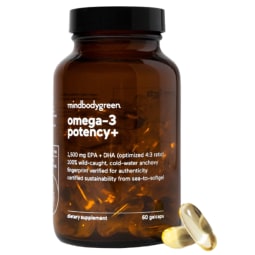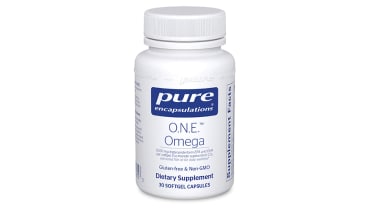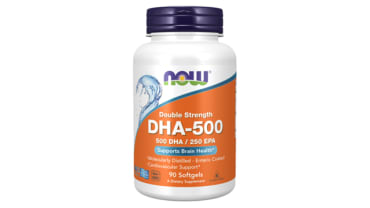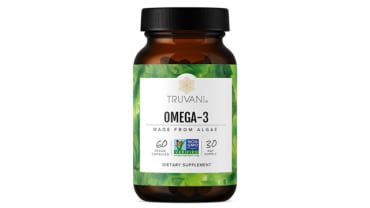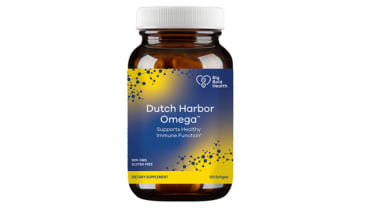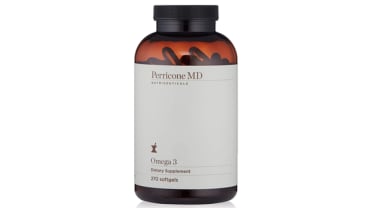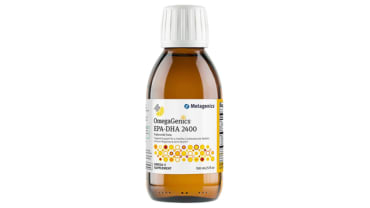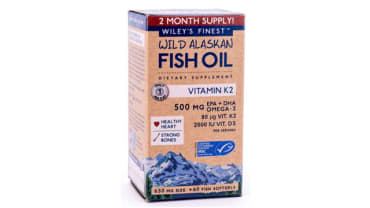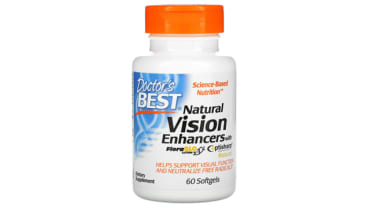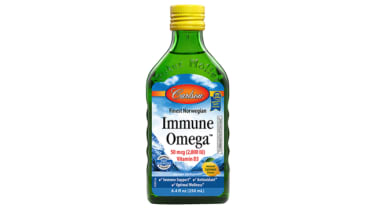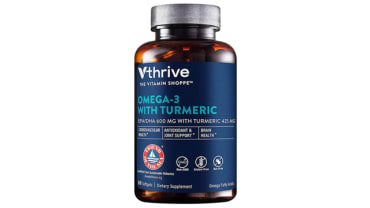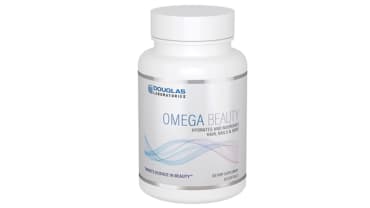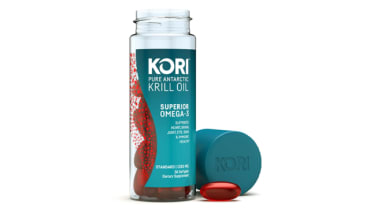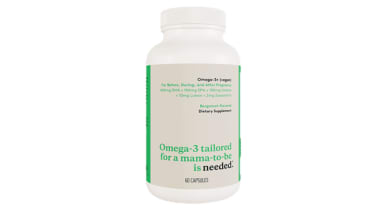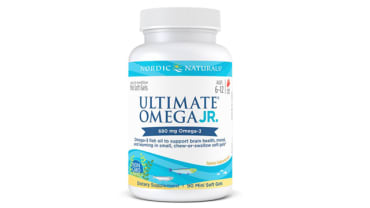Advertisement
The 15 Best Omega-3 Supplements Of 2025, According To A Nutrition Scientist


Quick list: The best omega-3 supplements
Data from the National Center for Health Statistics shows that omega-3 supplements (specifically fish oil, which is the most common option) are the most popular supplement in the U.S. aside from multivitamins. Considering the far-reaching effects good-for-you omega-3 fatty acids have throughout the body, this isn't exactly a surprise.*
Honestly, it feels like a bit of a no-brainer. What isn't quite so obvious, though, is which of the many (and we mean many) omega-3 supplements out there you should actually dub worthy of incorporating into your routine.
There are a few crucial factors to consider when hunting for an omega-3 supplement that not only offers the daily dose of EPA and DHA you need to best support your unique health goals but that does so with a quality formula and sustainability and transparency in mind. After all, these healthy fats are one of the most under-consumed nutrients in America.
Use this guide to get clear on what a top-notch product really looks like, as well as which popular options get the mbg stamp of approval.
What are omega-3s?
In case you need a little background info here: Omega-3 fatty acids are a type of polyunsaturated fat. The plant-derived omega-3 ALA is essential, which means that it has a daily nutritional requirement12 and you have to get it from either food or supplements because the body can't produce it on its own.
Marine-sourced omega-3s EPA and DHA are considered "conditionally essential" because your body can technically synthesize them from ALA (assuming you consume ALA). But it's not that simple. Science repeatedly demonstrates that the conversion rate of ALA23 to EPA and DHA is very low. This is where food and supplements come in.
The benefits of taking an omega-3 supplement
Despite well-known recommendations about eating fish regularly (again, the minimum is two 3.5-ounce servings of fish each week), very few people actually do so. More than 90% of Americans3 fail to hit this beginner's benchmark.
Indeed, the average American adult only consumes about 86 milligrams of EPA plus DHA daily4 (and only about 1 ounce total of omega-3-rich fish per week).
A number of factors contribute to our lackluster fish consumption, from lack of access to fresh, quality seafood to concerns about sustainability to popular eating patterns such as veganism, suggesting that supplementing with those must-have omega-3s is likely a good idea for many of us.
Need more convincing? Research shows that omega-3s, particularly the EPA and DHA found in marine and algal sources, contribute to everything from cardiovascular health and cognition5 to healthy vision6, perinatal support7, joint mobility8, and a well-balanced mood9.*
And that's not all, either; these healthy fats have also been linked to bone health10 as well as robust immunity11—that's thanks to their widespread antioxidant12 and anti-inflammatory properties13.* (We highlight more benefits here if you're curious.)
Summary
our picks for the best omega-3 supplements
Pros
- 1,500 mg of EPA and DHA in each serving
- Supports heart, brain, joint, eye, immune, perinatal, and overall health*
- 100% wild-caught, cold-water fish from the South Pacific
Cons
- Not suitable for vegans (contains fish oil)
Form:
GelcapServing size:
2 gelcapsEPA per serving:
857 mgDHA per serving:
643 mgDietary:
Non-GMOGluten-freeEgg-freeDairy-freePeanut-freeShellfish-freeSoy-freeDelivering pure fish oil from 100% wild-caught, cold-water fish from the South Pacific, omega-3 potency+ is sustainable from sea to softgel. Set apart from the crowd by its potency (1.5 grams of EPA plus DHA) and third-party ORIVO certification that authenticates the fish species and origin, this new-school fish oil supplement prioritizes quality, purity, sustainability, and transparency at every step. In addition to the 1,500 milligrams of EPA and DHA in their most bioavailable triglyceride form, you'll enjoy an infusion of lemon oil and rosemary for fresh taste. When it comes to fish oil supplements, this is about as clean, innovative, and potent as it gets.*
Plus, save 10% on your first order with promo code MBG10.
Pros
- 1,000 mg of EPA and DHA
- Supports joint and connective tissue integrity*
- Promotes cardiovascular health*
Cons
- Plastic bottle
Form:
SoftgelServing size:
1 softgelEPA per serving:
600 mgDHA per serving:
400 mgDietary:
Non-GMOGluten-freeDairy-freeSoy-freeIf you’re just dipping your toe into starting an omega-3 supplement routine, this option from Pure Encapsulations is a great place to start. Just one softgel provides 1,000 milligrams of EPA and DHA—though it’s worth noting that its omegas come from a variety of sources, including anchovies, jack, herring, smelt, salmon, mackerel, and squid. The list of “other ingredients” is short and sweet—and the supplement uses tocopherols (different sources of vitamin E) to promote freshness.
Pros
- Supports brain health*
- Supports cardiovascular health*
- Enteric coated
Cons
- Contains soy-derived ingredient
- Plastic packaging
Form:
SoftgelServing size:
1 softgelEPA per serving:
250 mgDHA per serving:
500 mgDietary:
Non-GMOGluten-freeDairy-freeHalalKeto-friendlyKosherAnother solid supplement for anyone who tends to get fish burps after popping fish oil, these soft gels are also coated (with what’s known in the industry as an enteric coating) to help them get further into your digestive system before starting to open up. With a distinct DHA slant, these double-strength softgels contain 500 milligrams of DHA and 250 milligrams of EPA a piece, sourced from anchovies, sardines, and tuna. Enteric coating comes with its perks (but fyi, a longer excipient list, too).*
Pros
- Plant-based DHA (from algae)
- Supports brain health*
- Supports heart health*
Cons
- Plastic packaging
- No EPA
Form:
CapsuleServing size:
2 capsulesEPA per serving:
0 mgDHA per serving:
500 mgDietary:
Non-GMOGluten-freeEgg-freeDairy-freeSoy-freeVeganVegetarianIf you follow a strict vegan or no-fish vegetarian diet, you’ve probably wondered how you can get your omega-3 fix in a fish-free way. Made from marine algal oil (which, yes, is exactly how fish get their omega-3s), Truvani’s plant-based supplement is heavily skewed on the DHA front, packing 500 milligrams of DHA (but no EPA, mind you) and is both certified gluten-free and non-GMO. The capsule is made out of vegetable cellulose and chlorophyll, while tocopherols keep things fresh and organic lemon oil ensures zero pond scum flavor.*
Pros
- Supports healthy immune function*
- Sustainably sourced & packaged
- Includes proresolving mediators
Cons
- Added flavor
Form:
SoftgelServing size:
2 softgelsEPA per serving:
200 mgDHA per serving:
200 mgDietary:
Non-GMOGluten-freeDairy-freeSoy-freeMade from line-caught Alaskan cod that’s flash frozen to maintain as much nutrition as possible, Dutch Harbor Omega features a spectrum of omega-3 fatty acids, including EPA and DHA. The formula also provides unique bioactive omega-3 derived lipid compounds known as pro-resolving mediators. It also delivers naturally-occurring vitamins A and D. The supplement is made in a fishery certified by the Marine Stewardship Council for sustainability and has a flavor just as pleasant as its production process. Every two-softgel serving offers 400 milligrams of EPA and DHA.
Pros
- Supports a healthy heart*
- Helps hydrate skin*
Cons
- 3 softgel serving size
- Added flavor
Form:
SoftgelServing size:
3 softgelsEPA per serving:
255 mgDHA per serving:
270 mgDietary:
Soy-freeWheat-freeThe 690 milligrams of omega-3s (i.e., 525 milligrams of the EPA and DHA duo) you get in each three-softgel serving of Perricone MD’s fish oil supplement are derived from wild Alaskan salmon. Otherwise, this formula keeps things super simple, containing just fish gelatin, glycerin, purified water, and natural lemon flavor. While it offers a lower potency of omega-3s per softgel than some other options, its high-quality source and simple formulation make it a good go-to for those who don’t mind swallowing an extra supplement or two.
Pros
- 1,410 mg EPA and 990 mg DHA per serving
- Helps support cardiovascular, muskoskeletal, & immune system health
- Sustainably packaged
Cons
- Requires refrigeration
- Added flavor
Form:
LiquidServing size:
1 tspEPA per serving:
1,410 mgDHA per serving:
990 mgDietary:
Non-GMOGluten-freeDairy-freeSoy-freeIf swallowing softgels just isn’t for you, OmegaGenics is one of the most pleasant liquid fish oils you can slurp down. (You can thank the natural lemon flavor for that.) Every teaspoon packs in the good stuff, offering 1,410 milligrams of EPA and 990 milligrams of DHA, plus 400 milligrams of other omega-3s, all in their highly absorbable triglyceride form. Metagenics sources their cold-water fish (anchovies, sardines, and mackerel) from fisheries who use sustainable practices and has the product third-party tested for purity, freshness, and potency.*
Pros
- 500 mg EPA + DHA
- Certified Sustainable Seafood MSC
Cons
- Ethyl ester form, so needs to be taken with a meal for absorption
Form:
SoftgelServing size:
1 softgelEPA per serving:
375 mgDHA per serving:
125 mgDietary:
Non-GMOGluten-freeDairy-freeSoy-freeIn addition to 375 milligrams of EPA and 125 milligrams of DHA sourced from wild Alaskan pollock, this formula provides 2,000 IU of vitamin D3 along with 80 micrograms of vitamin K2 in its bioavailable MK-7 form to support both bone and heart health. It’s also certified sustainable. Just note that since the omega-3s in this product are in ethyl ester form, you’ll want to take your supplement with a meal that contains some fat (or soon after one) in order to optimize absorption.*
Pros
- Helps support visual function*
- Helps neutralize free radicals and protect eyes from blue light*
- With lutein and zeaxanthin
Cons
- Plastic packaging
Form:
SoftgelServing size:
2 softgelsEPA per serving:
45 mgDHA per serving:
200 mgDietary:
Non-GMOGluten-freeYou’ve probably heard that omega-3 fatty acids play a notable role in supporting eye health and function—and Natural Vision Enhancers from Doctor’s Best combines them with other nutrients known for keeping your peepers in tip-top shape. Every serving provides 245 milligrams of EPA and DHA, plus 20 milligrams lutein and 4 milligrams of zeaxanthin, two antioxidant carotenoids that support healthy vision. It’s a good one to try if you want to both up your daily intake of these good-for-you fats and show your hard-working eyes some extra love.*
Pros
- Contains vitamins A, D3, and E
- Helps support a healthy immune system*
- Sustainably packaged
Cons
- Requires refrigeration
- Added flavor
Form:
LiquidServing size:
1 tspEPA per serving:
400 mgDHA per serving:
500 mgDietary:
Non-GMOGluten-freeDairy-freeSoy-freeIf you're willing to take a liquid supplement, Carlson's lemon-flavored fish oil (which is sourced from Norwegian cod liver oil) packs a one-two punch for your immune system. First, there are the impressive 900 milligrams of EPA and DHA; then, there's the 2,000 I.U. of vitamin D3, as well as some vitamins A and E—all of which have roles to play in promoting optimal immune function. And that's all in a single teaspoon. Processed and purified in a highly regulated Norwegian facility, Carlson's fish oil doesn't mess around when it comes to quality.*
Pros
- With turmeric extract
- Promotes healthy joints*
Cons
- Plastic packaging
- Relatively lower dose of EPA + DHA
Form:
SoftgelServing size:
1 softgelEPA per serving:
343 mgDHA per serving:
257 mgDietary:
Non-GMOGluten-freeDairy-freeSoy-freeSugar-freeSalt-freeThis Friend of the Sea-certified option focuses its efforts on supporting your joints by pairing 600 milligrams of EPA and DHA from anchovy oil with 425 milligrams of turmeric root extract (which is standardized to 95% curcuminoids, the powerhouse antioxidant phytonutrients found in the golden root). Mixed tocopherols keep things fresh—and clean supplement seekers will be pleased to see a short and easy-to-pronounce list of “other ingredients.”*
Pros
- Hydrates and nourishes hair, skin, and nails*
- Contains array of fatty acids
- With coriander and black currant seed oils
Cons
- Plastic packaging
Form:
SoftgelServing size:
2 softgelsEPA per serving:
200 mgDHA per serving:
100 mgDietary:
Non-GMOGluten-freeOmega Beauty isn’t the most potent omega-3 supplement in the game (each serving offers 300 milligrams of EPA and DHA). However, the formula does combine its omega-3s with a number of beauty-centric nutrients that make it a worthwhile addition to the routines of beauty lovers, specifically a small amount of the carotenoid lycopene, plus vitamins C and E and black currant seed and coriander seed oils. The combination of important fatty acids and antioxidants makes this formula a good one for encouraging hydrated, healthy hair, skin, and nails.*
Pros
- Supports heart, brain, joint, eye, and immune health*
- No fishy aftertaste (no fish)
- Certified sustainable from MSC
Cons
- Contains shellfish allergen
Form:
SoftgelServing size:
3 softgelsDietary:
Non-GMOGluten-freeDairy-freeWhy should fish get all the fun? Krill are natural harvesters of the microalgae they eat, making them another viable marine source of omega-3 fatty acids EPA and DHA in addition to oily fish. The tiny, shrimp-like crustaceans (of note for folks with a shellfish allergy) used in Kori Krill Oil are wild-caught in Antarctic waters and processed immediately on the boat to preserve freshness. A naturally good source of choline, the krill in these capsules help support brain and nervous system health—and with no fishy aftertaste.*
Pros
- For before, during, and after pregnancy
- With choline and carotenoids
- Supports brain health and mood*
- Vegan EPA and DHA (from algae)
Cons
- Up to 4 capsules per day
- Plastic packaging
Form:
CapsuleServing size:
2 capsulesEPA per serving:
400 mgDHA per serving:
100 mgDietary:
Non-GMOGluten-freeDairy-freeSoy-freeVeganVegetarianOmega-3 fatty acids are crucial during and after pregnancy, in part because of their roles in a baby’s brain and eye development. This vegan formula by Needed packs in 500 milligrams of omega-3's (400 milligrams of DHA plus 100 milligrams of EPA) from algal oil, carotenoids lutein and zeaxanthin from marigolds, and choline, another must-have nutrient for women before, during, and after pregnancy. You’ll enjoy the pleasant bergamot taste as much as you do the clean “other ingredients” list.*
Pros
- Chew-or-swallow softgel
- Support for brain health, mood, and learning*
Cons
- Plastic packaging
- Added flavor (strawberry)
Form:
SoftgelServing size:
2 softgelsEPA per serving:
340 mgDHA per serving:
245 mgDietary:
Non-GMOGluten-freeNordic Naturals is a big name in the world of fish oil—and their kids-specific Ultimate Omega Junior makes it easy (and tasty) for little tykes to get their omega-3s in. Flavored with natural strawberry and packaged into kid-friendly mini softgels, this certified sustainable supplement features predominantly triglyceride form omega-3s for easier absorption—and a substantial 585 milligrams of EPA and DHA omega-3s per serving (which is two itty-bitty softgels). Made from purified deep sea fish oil (sardines and anchovies), it’s a great go-to for kids ages six through 12.
What to look for in a quality omega-3 supplement
Wondering what it took to make this list of trusted supplement options?
Each had to fulfill a number of important criteria addressing factors like sourcing, potency, and transparency.
Whether you want to better understand how we selected the supplements featured here or know what to consider when searching for another option on your own, mbg vice president of scientific affairs Ashley Jordan Ferira, Ph.D., RDN, recommends prioritizing the following:
Omega-3 source
The omega-3 fatty acids EPA and DHA, which are derived mostly from marine sources (and a few options from algae for strict vegans), are must-haves.
Whenever possible, it's important to choose a marine-based omega-3 supplement that features sustainably sourced, wild-caught, cold-water fish with a balanced amount of EPA-to-DHA fats.
Algal oils are naturally skewed DHA-heavy (and are lacking on the EPA front), so that's a trade-off to consider.
When it comes to the form of those omega-3s, triglyceride is the most bioavailable14 per the science to date.*
Ethyl ester products can also be worthwhile; just remember to take those supplements with a meal containing some fat for optimal absorption15.*
Potency
We vetted and featured products with useful and clinically relevant levels (doses) of omega-3s.
We're interested in the total milligram or gram amount of EPA plus DHA (again, the active ingredients) here instead of the total fish oil or omega-3 concentrate amount listed on labels, which can appear misleadingly high.
Most of the supplements spotlighted here deliver at least 500 milligrams of EPA and DHA, which is the minimum evidence-based recommendation per the Academy of Nutrition and Dietetics16 and other entities.
It's the rough EPA plus DHA equivalent of two servings of oily fish17 consumed a week.
That said, many selections actually boast higher potencies, coming in at 1,000 milligrams and higher of combined EPA and DHA because the American Heart Association and collective science indicate greater cardioprotective and whole-body benefits at these 1 gram-plus levels.* (That's the omega-3 equivalent of eating a fish a day, by the way).
Quality
Reputable brands invest in the quality of their supplements, from the raw materials (the original fish or algal oil) to the finished product.
For fish oil, purity is of the utmost importance, so levels of heavy metals, dioxins, furans, and PCBs should be very low and competitive in the industry.
Low oxidation parameters are also important, since—as with any oil (including the olive oil you cook with)—rancidity can be an issue if quality-control parameters aren't top-notch. After all, fish oil isn't actually supposed to be fishy.
Transparency
Fish species and country of origin also matter to us, as these factors illuminate a product's transparency and sustainability.
Brands that authenticate the fish species featured in their supplements (mindbodygreen's omega-3 potency+ does this via a third-party ORIVO certification) really go the extra mile here.
This rigorous level of evidence-based transparency is unique to the new school of supplements.
Minimal "other Ingredients"
Omega-3 supplements with a lean list of "other ingredients" are ideal. We prefer plant-based antioxidants (such as rosemary) for natural preservation of fish oil, but tocopherols (vitamin E) are also often added for this purpose and are another good option.*
We also value products that limit or avoid unnecessary or synthetic fillers, dyes, flavors, and sweeteners.
In the case of mbg's omega-3 potency+, you'll find that lemon oil found its way into our ingredient list with intention.
This infusion of citrus fruit allows you to enjoy all the benefits of fish oil minus the fishy aftertaste.
We applaud other brands that also care about user experience since taste and fish burp are major deterrents reported by people who've unfortunately stopped taking their fish oil.
Summary
How we chose
Ingredients
Our team ensures that each supplement product is thoughtfully formulated from the active ingredients to those "Other ingredient" excipients, too. We are highly preferential towards clean formulas that are plant-centric (and oftentimes vegan or vegetarian) as well as free of GMOs, gluten, soy, dairy, major food allergens, high-fructose corn syrup, artificial sweeteners, synthetic dyes, and more.
Quality
We included omega-3 supplements that prioritize quality. This includes robust manufaturing practices and comprehensive purity and potency testing. This helps ensure that impurities are absent or kept to a minimum (trace levels intrinsic to the environment, for example) and that active ingredients are included at the doses they state on the label.
Sustainability
We take pride in highlighting green initiatives and certifications, as well as sustainable product features that honor the environment through recyclable, eco-friendly packaging options.
Vetting
Our expert-vetted dietary supplement product selections and recommendations in the supplement space elevate quality, efficacy, innovation, and safety.
What our reviewers say about mindbodygeen's omega-3 potency+
Frequently Asked Questions
How many milligrams of omega-3 should I take?
There are three main types of omega-3 fatty acids: eicosapentaenoic acid (EPA), docosahexaenoic acid (DHA), and alpha-linolenic acid (ALA). While there is an established daily requirement for carbs, protein, fat, fiber, water, vitamins, minerals, and even ALA (which comes from plant sources), there is no official daily recommended intake from the National Academies for EPA or DHA. However, based on decades of scientific research, the robust evidence for these marine omega-3s has led many scientific and nutritional organizations to issue their own guidelines to ensure people are getting their fill of these two especially beneficial fatty acids. The Dietary Guidelines for Americans, for example, recommend that people consume 8 ounces (about two servings) of fish per week—that equates to about 250 to 500 milligrams of combined EPA and DHA per day as a baseline, starting point for intake. On top of that, the American Heart Association recommends upping that intake to 1,000 milligrams (1 gram) or more of EPA plus DHA daily to further promote cardiovascular health.*
Is fish oil good for your hair?
Yes. Research shows that fish oil (and, more specifically, DHA—a marine omega-3 fatty acid found primarily in fatty fish) helps promote hair growth by stimulating anagen-activating pathways in hair follicle cells. These good-for-you polyunsaturated omega-3 fats are helpful at the level of the hair cell, and more research is warranted to further bolster this area of exciting research.*
Are there any side effects of taking fish oil supplements?
A major complaint of taking fish oil is flavor and "fishy burps," but a high-quality fish oil should not have a "fishy" aftertaste (which is a sign of oxidation and rancidity). Some people are simply more prone to burps, and as such, some fish oil brands will include helpful complementary ingredients (e.g., lemon oil) for a pleasant taste experience if you happen to burp.
What medications should not be taken with fish oil?
A common concern when it comes to supplementing with fish oil or omega-3 supplements is that too much fish oil thins your blood (and thus, is always a concern for those taking blood-thinning medications). However, this is also a common misconception. Why? Because the totality of scientific evidence from epidemiological and clinical trial research over the past 30 years does not demonstrate an increased risk for bleeding when consuming as low as 500 milligrams of EPA plus DHA or even extremely high doses of 10 grams (10,000 milligrams), of which nobody is coming close to consuming through a fish oil supplement. However, out of an abundance of caution, individuals taking any medication should always consult with their doctor regarding any personal health issues or concerns before adding fish oil or any dietary supplement into their routine.
What is the best time of day to take a fish oil supplement?
When it comes to fish oil, the specific time of day doesn't seem to matter as much as the types of food you pair your supplement with. Experts agree that the omega-3 fatty acids in fish oil have been shown to be better absorbed when taken with a fat-containing meal, rather than on an empty stomach, (more on that here).
The takeaway
Unless you're consistently putting fish on your plate throughout the week every week, you're probably not getting in the amounts of EPA and DHA that have been linked with positive health perks.*
Don't sweat it; you're far from the only one.
If you're not willing and able to up your intake of fatty fish, though, a high-quality omega-3 supplement is a simple addition to your daily routine that helps everything from your brain to your cardiovascular system to your bones get enough of these crucial fatty acids to function at their best.*
While this list captures our favorite options on the market, you can also use the criteria listed here to hunt for your own ideal omega-3 product.
As always, don't hesitate to reach out to your healthcare practitioner if you're considering adding a new supplement to your regimen, especially if you take certain medications or have specific health goals in mind.
Meet The Experts
17 Sources
- https://lpi.oregonstate.edu/mic/other-nutrients/essential-fatty-acids
- https://academic.oup.com/ajcn/article/83/6/1467S/4633217
- https://pubmed.ncbi.nlm.nih.gov/28956299/
- https://www.ncbi.nlm.nih.gov/labs/pmc/articles/PMC3992162/
- https://www.ncbi.nlm.nih.gov/pmc/articles/PMC4537710/
- https://www.ncbi.nlm.nih.gov/pmc/articles/PMC5519357/
- https://www.ncbi.nlm.nih.gov/labs/pmc/articles/PMC3046737/
- https://www.cambridge.org/core/journals/proceedings-of-the-nutrition-society/article/fish-oil-and-rheumatoid-arthritis-past-present-and-future/7FF1F54E526A58F4BD1553CADE365EAE
- https://www.sciencedirect.com/science/article/abs/pii/S0165178115003844
- https://www.ncbi.nlm.nih.gov/pmc/articles/PMC3899785/
- https://www.cambridge.org/core/journals/proceedings-of-the-nutrition-society/article/n3-fatty-acids-inflammation-and-immunity-new-mechanisms-to-explain-old-actions/32B437E39C8420D43E490DDFC9F1480D
- https://www.sciencedirect.com/science/article/abs/pii/S1043661819311910?via%3Dihub
- https://www.ncbi.nlm.nih.gov/pmc/articles/PMC3257651/
- https://www.ncbi.nlm.nih.gov/pmc/articles/PMC5490608/
- https://www.ncbi.nlm.nih.gov/pmc/articles/PMC4957330/
- https://www.jandonline.org/article/S2212-2672(13)01672-9/fulltext
- https://www.heart.org/en/healthy-living/healthy-eating/eat-smart/fats/fish-and-omega-3-fatty-acids
